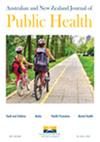Public support for unhealthy food marketing policies in Australia: A cross-sectional analysis of the International Food Policy Study 2022
IF 2.4
3区 医学
Q2 PUBLIC, ENVIRONMENTAL & OCCUPATIONAL HEALTH
Australian and New Zealand Journal of Public Health
Pub Date : 2025-04-01
DOI:10.1016/j.anzjph.2025.100231
引用次数: 0
Abstract
Objective
This study aimed to explore public opinion towards food marketing policies.
Methods
In 2022, a cross-sectional online survey was completed by 3,923 adults in Australia, including 1,152 caregivers of children aged <18 years. Concern about children’s exposure to unhealthy food marketing was assessed among caregivers. Public support for seven policy options to restrict unhealthy food marketing in different media and settings (broadcast, online, outdoors, packaging and retail) was quantified. Multivariable regression analyses were conducted to examine sociodemographic differences.
Results
Most caregivers (85%) reported some degree of concern about their child’s exposure to unhealthy food marketing. Among all respondents, there was a high level of support or neutrality (>70%) for all policies aimed at restricting unhealthy food marketing. Respondents who were female, older, highly educated, who identified as Aboriginal and/or Torres Strait Islander, perceived their monthly income as adequate or had at least one child living in the household reported higher support/neutrality towards several of the assessed policies.
Conclusions
Most Australian adults were supportive or neutral towards policies restricting unhealthy food marketing. The level of support varied depending on the policy’s target group and its setting.
Implications for Public Health
Implementing unhealthy food marketing policies in Australia would most likely have broad public support and minimal opposition.
澳大利亚公众对不健康食品营销政策的支持:对 2022 年国际食品政策研究的横截面分析。
目的:本研究旨在了解公众对食品营销政策的看法。方法:2022年,澳大利亚3923名成年人完成了一项横断面在线调查,其中包括1152名老年儿童的照顾者。结果:大多数照顾者(85%)表示对他们的孩子接触不健康食品营销有一定程度的担忧。在所有受访者中,对旨在限制不健康食品营销的所有政策都持高度支持或中立态度(70%以上)。女性、年龄较大、受过高等教育、被认定为土著和/或托雷斯海峡岛民、认为自己的月收入充足或家中至少有一个孩子的受访者对几项评估政策表示更高的支持/中立。结论:大多数澳大利亚成年人对限制不健康食品营销的政策持支持或中立态度。支持的程度取决于政策的目标群体及其设置。对公众健康的影响:在澳大利亚实施不健康食品营销政策很可能得到广泛的公众支持和最小的反对。
本文章由计算机程序翻译,如有差异,请以英文原文为准。
求助全文
约1分钟内获得全文
求助全文
来源期刊

Australian and New Zealand Journal of Public Health
医学-公共卫生、环境卫生与职业卫生
CiteScore
4.20
自引率
5.70%
发文量
121
审稿时长
6-12 weeks
期刊介绍:
The Australian and New Zealand Journal of Public Health (ANZJPH) is concerned with public health issues. The research reported includes formal epidemiological inquiries into the correlates and causes of diseases and health-related behaviour, analyses of public policy affecting health and disease, and detailed studies of the cultures and social structures within which health and illness exist. The Journal is multidisciplinary and aims to publish methodologically sound research from any of the academic disciplines that constitute public health.
 求助内容:
求助内容: 应助结果提醒方式:
应助结果提醒方式:


